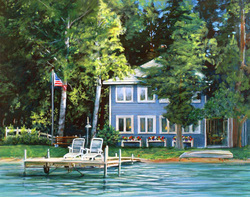 © Patty Fitts. All Rights Reserved.
© Patty Fitts. All Rights Reserved. Then he tied on a small silver lure and practiced casting. The lure struck the water and caused colored ripples in the sunset, thin silver ripples as the moon rose over the lake. When his pole doubled over, he knew something huge was on the other end. His father watched with admiration as the boy skillfully worked the fish along side the dock.
Finally, he very gingerly lifted the exhausted fish from the water. It was the largest one he had ever seen, but it was a bass. The boy and his father looked at the handsome fish, gills playing back and forth in the moonlight. The father lit a match and looked at his watch. It was 10 p.m. -- two hours before the season opened. He looked at the fish, then at the boy. "You'll have to put it back, Son," he said.
"Dad!" cried the boy. "There will be another fish," Dad said. "Not as big as this one," cried the boy. He looked around the lake. No other fishermen or boats were around in the moonlight. He looked again at his father. Even though no one had seen them, nor could anyone ever know what time he caught the fish, the boy could tell by the clarity of his father’s voice that the decision was not negotiable. He slowly worked the hook out of the lip of the huge bass and lowered it into the black water. The creature swished its powerful body and disappeared. The boy suspected that never again would he see such a great fish.
That was 34 years ago. Today, the boy is a successful architect in New York City. His father's cabin is still there on the island in the middle of the lake. He takes his own son and daughters fishing from the same dock.
He was right. He has never again caught such a magnificent fish as the one he landed that night long ago. But he does see that same fish -- again and again -- every time he comes up against a question of ethics. For, as his father taught him, ethics are simple matters of right and wrong. It is only the practice of ethics that is difficult. Do we do right when no one is looking? Do we refuse to cut corners to get the design in on time? Or refuse to trade stocks based on information that we aren't supposed to have?
We would if we were taught to put the fish back when we were young. For we would have learned the truth. The decision to do right lives fresh and fragrant in our memory. It is a story we will proudly tell our friends and our grandchildren. Not about how we had a chance to beat the system and took it, but about how we did the right thing and were forever strengthened.
Reprinted from Grace Drops, Volume 3 (2005).
 RSS Feed
RSS Feed
